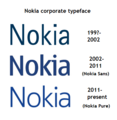Nokia
 Logo used since 2023 | |
 | |
Native name | Nokia Oyj |
|---|---|
| Company type | Public |
| |
| ISIN | FI0009000681 |
| Industry | |
| Predecessors |
|
| Founded | 12 May 1865 in Tampere, Grand Duchy of Finland |
| Founders | |
| Headquarters | , Finland |
Area served | Worldwide |
Key people | |
| Products | List of Nokia products |
| Revenue | |
| Total assets | |
| Total equity | |
Number of employees | |
| Divisions | |
| Subsidiaries |
|
| Website | nokia |
| Footnotes / references [2][3][4] | |
Nokia Corporation[5][a] is a Finnish multinational telecommunications, information technology, and consumer electronics corporation, originally established as a pulp mill in 1865. Nokia's main headquarters are in Espoo, Finland, in the Helsinki metropolitan area,[3] but the company's actual roots are in the Tampere region of Pirkanmaa.[6] In 2020, Nokia employed approximately 92,000 people[7] across over 100 countries, did business in more than 130 countries, and reported annual revenues of around €23 billion.[4] Nokia is a public limited company listed on the Nasdaq Helsinki and New York Stock Exchange.[8] It was the world's 415th-largest company measured by 2016 revenues, according to the Fortune Global 500, having peaked at 85th place in 2009.[9] It is a component of the Euro Stoxx 50 stock market index.[10][11]
The company has operated in various industries over the past 150 years. It was founded as a pulp mill and had long been associated with rubber and cables, but since the 1990s has focused on large-scale telecommunications infrastructure, technology development, and licensing.[12] Nokia made significant contributions to the mobile telephony industry, assisting in the development of the GSM, 3G, and LTE standards. For a decade beginning in 1998, Nokia was the largest worldwide vendor of mobile phones and smartphones. In the later 2000s, however, Nokia suffered from a series of poor management decisions and soon saw its share of the mobile phone market drop sharply.
After a partnership with Microsoft and Nokia's subsequent market struggles,[13][14][15] in 2014, Microsoft bought Nokia's mobile phone business,[16][17] incorporating it as Microsoft Mobile.[18] After the sale, Nokia began to focus more on its telecommunications infrastructure business and on Internet of things technologies, marked by the divestiture of its Here mapping division and the acquisition of Alcatel-Lucent, including its Bell Labs research organization.[19] The company then also experimented with virtual reality and digital health, the latter through the purchase of Withings.[20][21][22][23] The Nokia brand returned to the mobile and smartphone market in 2016 through a licensing arrangement with HMD.[24] Nokia continues to be a major patent licensor for most large mobile phone vendors.[25] As of 2018,[update] Nokia is the world's third-largest network equipment manufacturer.[26]
The company was viewed with national pride by Finns, as its mobile phone business made it by far the largest worldwide company and brand from Finland.[27] At its peak in 2000, Nokia accounted for 4% of the country's GDP, 21% of total exports, and 70% of the Nasdaq Helsinki market capital.[28][29]60°13′30″N 24°45′22″E / 60.225°N 24.756°E
History
[edit]1865–1967
[edit]
Nokia's history dates from 1865, when mining engineer Fredrik Idestam established a pulp mill on the shores of the Tammerkoski rapids near the town of Tampere, Finland (then a Grand Duchy under Russian Empire's rule).[6] A second pulp mill was opened in 1868 near the neighboring town of Nokia, where there were better hydropower resources.[6] In 1871, Idestam, together with a friend Leo Mechelin, formed a shared company and called it Nokia Ab (in Swedish, Nokia Company being the English equivalent), after the site of the second pulp mill.
Idestam retired in 1896, making Mechelin the company's chairman; he expanded into electricity generation by 1902, which Idestam had opposed. In 1904, Suomen Gummitehdas (Finnish Rubber Works), a rubber business founded by Eduard Polón, established a factory near the town of Nokia and used its name.
In 1922, in the now independent Finland, Nokia Ab entered into a partnership with the Finnish Rubber Works and Kaapelitehdas (the Cable Factory), all now jointly under the leadership of Polón. The rubber company grew rapidly when it moved to the Nokia region in the 1930s to take advantage of the electricity supply, and the cable company soon did too.
Nokia at the time also made respirators for both civilian and military use, from the 1930s well into the early 1990s.[30]
1967–1990
[edit]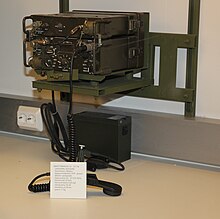
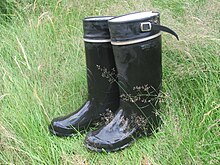
In 1967, the three companies – Nokia, Kaapelitehdas, and Finnish Rubber Works – merged to create a new Nokia Corporation, restructured into four major businesses: forestry, cable, rubber, and electronics. In the early 1970s, it entered the networking and radio industries. Nokia started making military equipment for Finland's defence forces (Puolustusvoimat), such as the Sanomalaite M/90 communicator in 1983, and the M61 gas mask first developed in the 1960s. Nokia was now also making professional mobile radios, telephone switches, capacitors and chemicals.
After Finland's trade agreement with the Soviet Union in the 1960s, Nokia expanded into the Soviet market. It soon widened trade, ranging from automatic telephone exchanges to robotics among others; by the late 1970s, the Soviet Union became a major market for Nokia, yielding high profits. The U.S. government became increasingly concerned of the possible export of items it deemed as high technology, such as digital telephone exchanges, to the Soviet Union in the 1980s. This led to Finland entering the Coordinating Committee for Multilateral Export Controls in 1987.[31] This was a demonstration of Finland balancing between both sides, as it was neutral during the Cold War.
In 1977, Kari Kairamo became CEO and transformed the company's businesses. By this time, Finland was becoming what has been called "Nordic Japan".[by whom?] Under his leadership, Nokia acquired many companies, including television maker Salora in 1984, followed by Swedish electronics and computer maker Luxor AB in 1985, and French television maker Oceanic in 1987. This made Nokia the third-largest television manufacturer of Europe (behind Philips and Thomson). The existing brands continued to be used until the end of the television business in 1996.
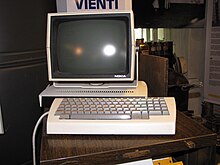
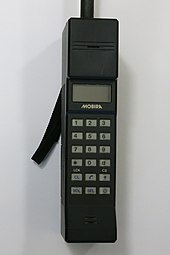
In 1987, Nokia acquired Schaub-Lorenz, the consumer operations of Germany's Standard Elektrik Lorenz (SEL), which included its "Schaub-Lorenz" and "Graetz" brands. It was originally part of American conglomerate International Telephone & Telegraph (ITT), and after the acquisition products were sold under the "ITT Nokia" brand, despite SEL's sale to Compagnie Générale d'Electricité (CGE), the predecessor of Alcatel, in 1986.
In 1987, Kaapelitehdas discontinued production of cables at its Helsinki factory after 44 years, effectively shutting down the sub-company.
On 1 April 1988, Nokia bought the Information Systems division of Ericsson,[32] which had originated as the Datasaab computer division of Swedish aircraft and car manufacturer Saab. Ericsson Information Systems made Alfaskop terminals, typewriters, minicomputers and Ericsson-branded IBM compatible PCs. The merger with Nokia's Information Systems division—which since 1981 had a line of personal computers called MikroMikko—resulted in the name Nokia Data.

Nokia also acquired Mobira, a mobile radio telephone manufacturer that had been established in a joint venture with Salora Oy in 1979, which became the foundation of its future mobile phone business. In 1981, Mobira launched the Nordic Mobile Telephone (NMT) service, the world's first international cellular network and the first to allow international roaming. In 1982, Mobira launched the Mobira Senator car phone, Nokia's first mobile phone. At that time, the company had no interest in producing mobile phones, which the executive board regarded as akin to James Bond's gadgets: improbably futuristic and niche devices. After all these acquisitions, Nokia's revenue base became US$2.7 billion.
CEO Kairamo killed himself on 11 December 1988.
-
Mobira 800-NDB non-directional beacon located in the Finnish Air Force signals museum
-
Nokia MAC 8532 laser rangefinder previously used by Finnish coastal artillery
-
Hämeenlinna artillery museum display containing fire control officer with Nokia artillery calculator in Finnish artillery battalion command post
-
Late 1980s MikroMikko 4 TT m216 desktop computer in the Museum of Technology, Helsinki, Finland
-
ITT Nokia television with an ITT Nokia VCR (ITT/SEL)
-
A 1986 Mobira pager
1990–2010
[edit]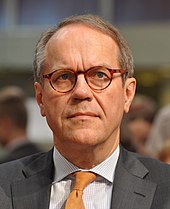

Following Simo Vuorilehto's appointment as CEO, a major restructuring was planned. With 11 groups within the company, Vuorilehto divested industrial units he deemed as un-strategic. Nokian Tyres (Nokian Renkaat), a tyre producer originally formed as a division of Finnish Rubber Works in 1932, split away from Nokia Corporation in 1988. Two years later, in 1990, Finnish Rubber Works followed suit. In 1991, Nokia sold its computer division, Nokia Data, to UK-based International Computers Limited (ICL), the precursor of Fujitsu Siemens. Investors thought of this as financial trouble and Nokia's stock price sank as a result. Finland was now also experiencing its worst recession in living memory, and the collapse of the Soviet Union, a major customer, made matters worse.
Vuorilehto quit in January 1992 and was replaced by Jorma Ollila, who had been the head of the mobile phone business from 1990 and advised against selling that division. Ollila decided to turn Nokia into a "telecom-oriented" company, and he eventually got rid of divisions like the power business. This strategy proved to be very successful, and the company grew rapidly in the following years. Nokia's operating profit went from negative in 1991 to $1 billion in 1995 and almost $4 billion by 1999.[33]
Nokia's first fully portable mobile phone after the Mobira Senator was the Mobira Cityman 900 in 1987. Nokia assisted in the development of the GSM mobile standard in the 1980s and developed the first GSM network with Siemens, the predecessor to Nokia Siemens Network. The world's first GSM call was made by Finnish prime minister Harri Holkeri on 1 July 1991, using Nokia equipment on the 900 MHz band network built by Nokia and operated by Radiolinja. In November 1992, the Nokia 1011 launched, making it the first commercially available GSM mobile phone.[34]
Salora Oy as a Nokia subsidiary ended in 1989 when the division was merged into Nokia-Mobira Oy. The brand continued to be used for televisions until 1995.
On 12 June 1996, Nokia announced the sale of its television business to Canada/Hong Kong-based Semi-Tech Corporation.[35] The television manufacturing plant in Germany closed down in September 1996. The sale included a factory in Turku and the rights to use the Nokia, Finlux, Luxor, Salora, Schaub-Lorenz, and Oceanic brands until the end of 1999.[36] Some of these brands were later sold to other companies.
Nokia was the first to launch digital satellite receivers in the UK, announced in March 1997.[37] In August 1997, Nokia introduced the first digital satellite receiver with Common Interface (CI) support.[38] In 1998, Nokia became the chosen supplier to produce the world's first digital terrestrial television set-top boxes by British Digital Broadcasting (BDB), which was eventually launched as ONdigital.[39]
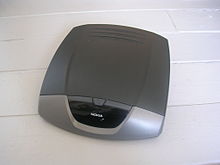
In October 1998, Nokia overtook Motorola to become the best-selling mobile phone brand[40] and in December, manufactured its 100 millionth mobile phone.[41] A major reason why Nokia grew against its main competitors Motorola and Ericsson was that it managed to cater to the consumer youth market and fashion-oriented consumers, most significantly with the Nokia 5110 and 3210 handsets, which featured a large range of colourful and replaceable back covers called Xpress-on.[42][43] One of the earliest fashion phones in 1992, from Swiss watchmaker Swatch, was based on Nokia's 101 handset.[44] The company would also form the Vertu division, creating luxury mobile handsets.
In April 1996, Nokia claimed its 447Xav and 447K monitors to be the first with stereo speakers and a subwoofer.[45] In May 1999, Nokia introduced their first wireless LAN products.[46] In January 2000, ViewSonic acquired Nokia Display Products, the division making displays for personal computers.[47] On 26 April 2001, Nokia partnered with Telefónica to supply DSL modems and routers in Spain.[48]
In 1997, Nokia established a joint venture with Brazilian electronics firm Gradient where they were granted the license to manufacture variants of Nokia mobile phones locally under the Nokia and Gradient brand names.[49]
In 1998, Nokia cofounded Symbian Ltd., led by Psion, to create a new operating system for PDAs and smart mobile phones as a successor of EPOC32. They released the Nokia 9210 Communicator running Symbian OS in 2001 and later that year created the Symbian Series 60 platform, later introducing it with their first camera phone, the Nokia 7650. Both Nokia and Symbian eventually became the largest smartphone hardware and software maker, respectively, and in February 2004, Nokia became the largest shareholder of Symbian Ltd.[50] Nokia acquired the entire company in June 2008 and then formed the Symbian Foundation as its successor.[51]
In 1998 alone, the company had sales revenue of $20 billion, making $2.6 billion profit. By 2000, Nokia employed over 55,000 people[52] and had a market share of 30% in the mobile phone market, almost twice as large as its nearest competitor, Motorola.[53] The company was operating in 140 countries as of 1999. It was reported at the time that some people believed Nokia to be a Japanese company.[54] Between 1996 and 2001, Nokia's turnover increased fivefold, from €6.5 billion to €31 billion.[55] Meanwhile, a Reader's Digest survey held near end 2000 showed that Nokia was the "most trusted brand in Europe", ranking better than Sony, Canon, and Nivea.[56]
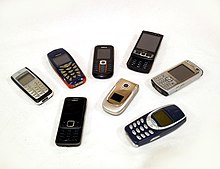
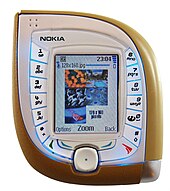
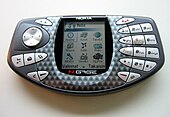
The company would then be known as a successful and innovative maker of camera phones. The Nokia 3600/3650 was the first camera phone on sale in North America in 2003. In April 2005, Nokia partnered with German camera optics maker Carl Zeiss AG.[57] That same month, Nokia introduced the Nseries, which would become its flagship line of smartphones for the next six years.[58] The Nokia N95 was introduced in September 2006, became highly successful, and was also awarded "best mobile imaging device" in Europe in 2007.[59] Its successor the N82 featured a xenon flash,[60] which helped it win the award of "best mobile imaging" device in Europe in 2008.[61] The N93 in 2006 was known for its specialized camcorder and the twistable design that switches between clamshell and a camcorder-like position.[62] They were also well known for the N8 with a high-resolution 12-megapixel sensor, in 2010; the 808 PureView with a 41-megapixel sensor, in 2012; and the Lumia 920 flagship, which implemented advanced PureView technologies, in 2012.[63]
Nokia was one of the pioneers of mobile gaming due to the popularity of Snake, which came preloaded on many products. In 2002, Nokia attempted to break into the handheld gaming market with the N-Gage.[64] Nokia's head of entertainment and media, Ilkka Raiskinen, once said, "Game Boy is for 10-year-olds",[65] stating that N-Gage is more suited to a mature audience. However, the device was a failure, unable to challenge the dominant market leader, Nintendo. Nokia attempted to revive N-Gage as a platform for their S60 smartphones, which eventually launched in 2008.[66]
In Q1 2004, Nokia's mobile phone handset market share steeply dropped to 28.9%, down from 34.6% a year earlier.[67] However, by 2006, the company was steadily gaining again[68][69] and in Q4 2007 reached its all-time high figure of 40.4%.[70] Its smartphone market share in that quarter was 51%.[71] Nokia was the largest vendor at the time in all regions bar North America.[72]
Nokia launched mobile TV trials in 2005 in Finland with content provided by public broadcaster Yle. The services are based on the DVB-H standard. It could be viewed with the widescreen Nokia 7710 smartphone with a special accessory enabling it to receive DVB-H signals.[73] Nokia partnered with Arqiva and O2 to launch trials in the UK in September 2005.[74]
In 2005, Nokia developed a Linux-based operating system called Maemo, which shipped that year on the Nokia 770 Internet Tablet.
On 1 June 2006, Jorma Ollila became the company's chairman and retired as CEO, replaced by Olli-Pekka Kallasvuo.[75]
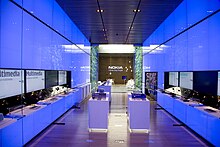
In August 2007, Nokia introduced Ovi, an umbrella name for the company's new Internet services, which included the N-Gage platform and the Nokia Music Store.[76] The Ovi Store faced stiff competition from Apple's App Store when it was introduced in 2008.[77]

In October 2008, Nokia announced the Nokia 5800 XpressMusic, the first device to ship with the new touch-centric S60 5th Edition, also known as Symbian^1, the first iteration of the platform since the creation of the Symbian Foundation. In November 2008, Nokia announced it would end mobile phone sales in Japan because of low market share.[78] Nokia's global mobile phone market share peaked in 2008 at 38.6 percent.[79] The same year, Nokia announced the acquisition of Trolltech and its Qt software development.[80] Qt was a central part of Nokia's strategy until 2011, and it was eventually sold in 2012.[81]
Nokia briefly returned to the computer market with the Booklet 3G netbook in August 2009.
2010–2014
[edit]
In late 2009 and in 2010, the music-focused Xseries and consumer-focused Cseries were introduced respectively.[82] In April 2010 Nokia introduced its next flagship mobile device, the Nokia N8, which would be the first to run on Symbian.[83] However it was delayed for many months which tarnished the company's image,[84] especially after the failure of its previous flagship N97 and tougher competition from Apple and the rising Google. On 10 September 2010, Olli-Pekka Kallasvuo was fired as CEO and it was announced that Stephen Elop from Microsoft would take Nokia's CEO position, becoming the first non-Finnish director in Nokia's history.[85] It was claimed that investors pressed Nokia's board to recruit an outsider to shake up management and break from the traditional "Nokia way".[86] Ollila had also announced that he would step down as Nokia chairman by 2012.[87] On 11 March 2011 Nokia announced that it had paid Elop a $6 million signing bonus as "compensation for lost income from his prior employer", on top of his $1.4 million annual salary.[88]

The old Symbian OS became completely open-source in February 2010.[89] However, in November 2010 it was announced that the Symbian Foundation was closing and that Nokia would take back control of the Symbian operating system under closed licensing.[90] By now Nokia was the only remaining company using the platform, along with carrier NTT Docomo in Japan, after both Samsung and Sony Ericsson moved to Android. Meanwhile, in 2010 for Nokia's Linux ambitions, Nokia collaborated with Intel to form the MeeGo project, after the merger of Nokia's own Maemo and Intel's Moblin.
Nokia's Symbian platform that had been the leading smartphone platform in Europe and Asia for many years was quickly becoming outdated and difficult for developers after the advent of iOS and Android. To counter this, Nokia planned to make their MeeGo Linux operating system, under development, the company's flagship on smartphones. Shortly after Elop's CEO tenure began, the Nokia board green-lit him the ability to change the company's mobile phones strategy, including changing operating systems.[91] Veteran Anssi Vanjoki, head of the smartphones division, left the company around this time.[92] His final appearance was at Nokia World 2010 when the Nokia E7-00 and other Symbian^3 devices were introduced.[93]
On 11 February 2011, Nokia announced a "strategic partnership" with Microsoft, under which it would adopt Windows Phone 7 as its primary operating system on smartphones, and integrate its services and platforms with its own, including Bing as search engine, and integration of Nokia Maps data into Bing Maps. Elop stated that Nokia chose not to use Android because of an apparent inability to "differentiate" its offerings, with critics also noting that his past ties to Microsoft may have also influenced the decision.[94][95][96] Although the MeeGo "Harmattan"-based N9 was met with a highly positive reception in 2011, Nokia had already decided to end development on MeeGo and solely focus on its Microsoft partnership, although the CEO said that the N9's "innovations" will live on in the future,[97] which eventually made their way on the Asha platform in 2013.[98] After the announcement of the Microsoft partnership, Nokia's market share deteriorated; this was due to demand for Symbian dropping when consumers realized Nokia's focus and attention would be elsewhere.[99]
The company posted a large loss for the second quarter of 2011 – only their second quarterly loss in 19 years.[100] Nokia's first Windows Phone flagship was the Lumia 800, which arrived in November 2011. Falling sales in 2011, which were not being improved significantly with the Lumia line in 2012, led to consecutive quarters of huge losses. By mid-2012 the company's stock price fell below $2.[101][102] CEO Elop announced cost-cutting measures in June by shedding 10,000 employees by the end of the year and the closure of the Salo manufacturing plant.[103] The Finnish prime minister also announced that the government wouldn't subsidize the company from an emergency state fund.[104] Around this time Nokia started a new project codenamed "Meltemi", a platform for low-end smartphones.[105] With the Microsoft alliance and under Elop's management, Nokia also had a renewed focus on the North American market where Nokia phones were, in stark contrast to the rest of the world, almost irrelevant for many years.[106][107] This strategy began in January 2012 with the introduction of the Nokia Lumia 900 smartphone in partnership with U.S. carrier AT&T.[108]
In March 2011, Nokia introduced a new corporate typeface called "Pure".[109] On 1 August 2011, Nokia announced that it would adopt a new three-digit naming system for mobile phone products and stop using letters, effectively ending the Nseries, Eseries, and short-lived Cseries. That same day the Nokia 500 was introduced with the new system.[110] Nokia last used three-digit names on analogue phones in the 1990s.[82]
When the Lumia 920 was announced in September 2012, it was seen by the press as the first high-end Windows Phone that could challenge rivals due to its advanced feature set. Elop said that the positive reaction to it had created a sense of hope and optimism in the company.[111] The company was also making gains in developing countries with its Asha series, which were selling strongly.[112] Although Nokia's smartphone sales and market share greatly increased throughout 2013, including in the North American market,[113] it was still not enough to avoid financial losses.[114] Ollila stepped down as chairman on 4 May 2012 and was replaced by Risto Siilasmaa.[115]

In September 2013, Nokia announced the sale of its mobile and devices division to Microsoft. The sale was positive for Nokia to avoid further negative financial figures, as well as for Microsoft's CEO Steve Ballmer, who wanted Microsoft to produce more hardware and turn it into a devices and services company.[116] The Nokia chairperson, Risto Siilasmaa, described the deal as rationally correct (in the best interests of Nokia shareholders), but emotionally difficult[117] – experts agree that Nokia would have been in a cash crisis had it not sold the division to Microsoft.[118][117] Analysts believe that Ballmer pushed for the buyout because of fears that Nokia was close to adopting Android and abandoning their alliance with Microsoft.[119][120] Indeed, in January 2014 the Nokia X was introduced which ran on a customised version of Android. It was a surprising and somewhat odd launch coming just weeks away from the finalization of the Microsoft buyout.[121][122] Others, including Ballmer's successor Satya Nadella, felt that Microsoft thought merging their software teams with Nokia's hardware engineering and designs would "accelerate" growth of Windows Phone.[123] The sale was completed in April 2014, with Microsoft Mobile becoming the successor to Nokia's mobile devices division. Nokia also moved from its headquarters to another building complex located at Karaportti. At the time, Ballmer himself was retiring as Microsoft CEO and was replaced by Satya Nadella, who opposed the Nokia mobile phones purchase, along with chairman Bill Gates.[124] The purchased assets from Nokia were eventually written-off by Microsoft in 2015.[125]
By 2014, Nokia's global brand value according to Interbrand fell to 98th place,[126] a sharp slide from the 5th place it was in 2009.[127] Nokia's downfall in the mobile phone market has had different explanations from analysts, with many split about the CEO's decision to abandon its in-house operating system and adopting Windows Phone in 2011.[128] Many researchers have concluded that Nokia suffered from deep internal rivalries within the management.[118][129][130][131] Former employees claimed that the management became so swollen by the early success that they grew complacent over time.[132][133] Some from the Symbian developing team have claimed that the company's upper management rejected hundreds of potential innovations during the 2000s that they proposed, including entirely rewriting Symbian's code. One former Nokia employee claimed that the company was run as a "Soviet-style bureaucracy".[134]
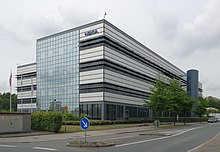
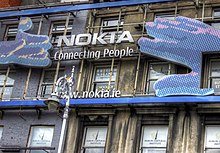
In July 2013, Nokia bought Siemens' stake in the Nokia Siemens Networks joint venture for $2.2 billion, turning it into a wholly owned subsidiary called Nokia Solutions and Networks,[135] until being rebranded as Nokia Networks soon after.[136] During Nokia's financial struggles, its profitable networking division with Siemens provided much of its income; thus, the purchase proved to be positive, particularly after the sale of its mobile devices unit.[137]
2014–2016
[edit]After the sale of its mobile devices division, Nokia focused on network equipment through Nokia Networks.[138]
In October 2014, Nokia and China Mobile signed a US$970 million framework deal for delivery between 2014 and 2015.[139]
On 17 November 2014, Nokia Technologies head Ramzi Haidamus disclosed that the company planned to re-enter the consumer electronics business as an original design manufacturer, licensing in-house hardware designs and technologies to third-party manufacturers. Haidamus stated that the Nokia brand was "valuable" but "is diminishing in value, and that's why it is important that we reverse that trend very quickly, imminently".[140] The next day, Nokia unveiled the N1, an Android tablet manufactured by Foxconn, as its first product following the Microsoft sale.[141] Haidamus emphasized that devices released under these licensing agreements would be held to high standards in production quality, and would "look and feel just like Nokia built it".[12] Nokia CEO Rajeev Suri stated that the company planned to re-enter the mobile phone business in this manner in 2016, following the expiration of its non-compete clause with Microsoft.[142]
According to Robert Morlino, the spokesman of Nokia Technologies, Nokia planned to follow the brand-licensing model rather than direct marketing of mobile devices due to the sale of its mobile devices division to Microsoft.[143] The company took aggressive steps to revitalize itself, evident through its hiring of software experts, testing of new products and seeking of sales partners.[144] On 14 July 2015, CEO Rajeev Suri confirmed that the company would make a return to the mobile phones market in 2016.[145]
On 28 July 2015, Nokia announced OZO, a 360-degrees virtual reality camera, with eight 2K optical image sensors. The division behind the product, Nokia Technologies, claimed that OZO would be the most advanced VR film-making platform.[146] Nokia's press release stated that OZO would be "the first in a planned portfolio of digital media solutions," with more technological products expected in the future.[147] OZO was fully unveiled on 30 November in Los Angeles. The OZO, designed for professional use, was intended for retail for US$60,000;[148] however, its price was decreased by $15,000 prior to release,[149] and is listed on its official website as $40,000.[150]
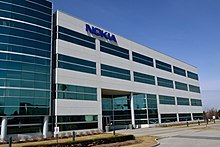
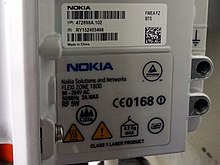
On 14 April 2015, Nokia confirmed that it was in talks with the French telecommunications equipment company Alcatel-Lucent regarding a potential merger.[151] The next day, Nokia announced that it had agreed to purchase Alcatel-Lucent for €15.6 billion in an all-stock deal.[152] CEO Rajeev Suri felt that the purchase would give Nokia a strategic advantage in the development of 5G wireless technologies.[153][154] The acquisition created a stronger competitor to the rival firms Ericsson and Huawei,[155] whom Nokia and Alcatel-Lucent had surpassed in terms of total combined revenue in 2014. Nokia shareholders hold 66.5% of the new combined company, while Alcatel-Lucent shareholders hold 33.5%. The Bell Labs division was to be maintained, but the Alcatel-Lucent brand would be replaced by Nokia.[152][156] In October 2015, following approval of the deal by China's Ministry of Commerce, the merger awaited approval by French regulators.[157] Despite the initial intent of selling the submarine cable division separately, Alcatel-Lucent later declared that it would not.[158] The merger closed on 14 January 2016,[159] but was not complete until 3 November 2016. From the acquisition, Nokia is now also the owner of the Alcatel Mobile phone brand, which continues to be licensed to TCL.
On 3 August 2015, Nokia announced that it had reached a deal to sell its Here digital maps division to a consortium of BMW, Daimler AG and Volkswagen Group for €2.8 billion.[160] The deal closed on 3 December 2015.[161]
2016–2019
[edit]On 26 April 2016, Nokia announced its intent to acquire French connected health device maker Withings for US$191 million. The company was integrated into a new Digital Health unit of Nokia Technologies.[162][163] Nokia later wrote off the cost of the acquisition and in May 2018 the health unit was sold back to Éric Carreel, a Withings co-founder and former CEO.[164]
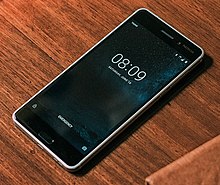
On 18 May 2016, Microsoft Mobile sold its Nokia-branded feature phone business to HMD Global, a new company founded by former Nokia executive Jean-Francois Baril, and an associated factory in Vietnam to Foxconn's FIH Mobile subsidiary. Nokia subsequently entered into a long-term licensing deal to make HMD the exclusive manufacturer of Nokia-branded phones and tablets outside Japan, operating in conjunction with Foxconn. The deal also granted HMD the right to essential patents and featurephone software. HMD subsequently announced the Android-based Nokia 6 smartphone in January 2017.[165][166] At Mobile World Congress, HMD additionally unveiled the Nokia 3 and Nokia 5 smartphones, as well as a re-imagining of Nokia's classic 3310 feature phone.[167][168] Nokia has direct investments in the company,[169] and they do have some input in the new devices.
On 28 June 2016, Nokia demonstrated for the first time a 5G-ready network.[170] In February 2017 Nokia carried out a 5G connection in Oulu, Finland using the 5GTF standard, backed by Verizon, on Intel architecture-based equipment.[171]
In July 2017, Nokia and Xiaomi announced that they have signed a business collaboration agreement and a multi-year patent agreement, including a cross-license to each company's cellular standard-essential patents.[172] In that year, Nokia's brand value was ranked 188th by Brand Finance, a jump of 147 places from 2016. Its rise was attributed to its health portfolio and new mobile phones developed by HMD Global.[173]
In January 2018, Nokia signed a deal with NTT Docomo, Japan's largest mobile operator, to provide 5G wireless radio base stations in the country by 2020.[174] Later that month, Nokia announced the ReefShark line of 5G chipsets, claiming that it triples bandwidth to 84 Gbit/s.[175] In March, Solidium, the investment arm of the Finnish Government, purchased a 3.3% stake in Nokia valued at €844 million.[176] In May, Nokia announced that it had acquired a California-based IoT startup, SpaceTime Insight.[177]
In January 2019, the Canadian government announced that it would provide $40 million to support Nokia's research on 5G technology.[178] A 2019 study revealed that Nokia phones performed far better than rivals Samsung, LG, Xiaomi, and Huawei in updating to the latest version of Android. The study, made by Counterpoint Research, found that 96 percent of Nokia phones were either sent with or updated to the latest Android version since Pie was released in 2018. Nokia's competitors were found to be all around roughly the 80 percent range.[179]
2020–present
[edit]On 2 March 2020, Nokia announced Pekka Lundmark as its new CEO.[180] Later that month, Nokia completed the acquisition of Elenion Technologies, a U.S.-based company focusing on silicon photonics technology to improve economics of advanced optical connectivity products.[181]
On 27 May 2020, Sari Baldauf succeeded Risto Siilasmaa as chairwoman of the board of directors, and Kari Stadigh was appointed vice chair. In June, Nokia won a 5G contract worth approximately $450 million[182] from Taiwan Mobile to build out the telecom operator's next-generation network as the sole supplier.[183] In October, Nokia announced a contract with NASA to build a 4G mobile network for astronaut usage on the moon. The $14.1 million contract, through subsidiary Bell Labs, was expected to begin in 2022.[184][185][186]
In 2020, Flipkart collaborated with Nokia to market Nokia-branded consumer products in India. These included televisions, a laptop and a range of air conditioners.[187]
In April 2022, Nokia announced that it would exit the Russian market following the country's invasion of Ukraine. The company stated that the decision would not affect its financial outlook as Russia accounted for less than 2% of Nokia's net sales in 2021.[188]
In February 2023, Nokia introduced a new logo for the first time in nearly 60 years[189] to change its brand identity as people still associated the previous logo with mobile phones.[190] The new logo was designed by Lippincott.[191]
In December 2023, Nokia acquired Fenix Group to strengthen its wireless offering in the defense segment for an undisclosed amount.[192] In the same month, Nokia announced a €185 million deal with Lumine Group to carve out its device management business (inherited from Alcatel-Lucent's purchase of Motive, Inc.) and its service management business (formerly Mformation). The deal completed in April 2024 and involved the transfer of around 500 Nokia employees.[193][194]
In February 2024, the company announced that it was accelerating its carbon neutrality target by 10 years to 2040 after having previously committed to cutting its carbon footprint across emissions scopes in half by 2030 from a 2019 baseline.[195]
In June 2024, Nokia acquired Infinera for $2.3 billion.[196]
Current operations
[edit]Nokia is a julkinen osakeyhtiö (public joint-stock company) listed on the Nasdaq Nordic/Helsinki and New York stock exchanges.[8] Nokia has played a very large role in the economy of Finland,[197][198] and it is an important employer in the country, working with multiple local partners and subcontractors.[199] Nokia contributed 1.6% to Finland's GDP and accounted for about 16% of the country's exports in 2006.[200]
Nokia comprises two business groups along with further subsidiaries and affiliated firms.
Nokia Networks
[edit]
Nokia Networks is Nokia Corporation's largest division. It is a multinational data networking and telecommunications equipment company headquartered in Espoo, Finland, and is the world's third-largest telecoms equipment manufacturer, measured by 2017 revenues (after Huawei and Cisco). In the USA it competes with Ericsson on building 5G networks for operators, while Huawei Technologies and ZTE Corporation were effectively banned.[201]
It has operations in around 150 countries.[202]
Nokia Networks provides wireless and fixed network infrastructure, communications and networks service platforms and professional services to operators and service providers.[203] It focuses on GSM, EDGE, 3G/W-CDMA, LTE and WiMAX radio access networks, supporting core networks with increasing IP and multiaccess capabilities and services.
The Nokia Siemens Networks (NSN) brand identity was launched at the 3GSM World Congress in Barcelona in February 2007 as a joint venture between Nokia (50.1%) and Siemens (49.9%),[204] although it is now wholly owned by Nokia. In July 2013, Nokia bought back all shares in Nokia Siemens Networks for a sum of US$2.21 billion and renamed it to Nokia Solutions and Networks, shortly thereafter changed to simply Nokia Networks.[205]
Nokia Technologies
[edit]
Nokia Technologies is a division of Nokia that develops consumer products and licenses technology including the Nokia brand.[206] Its focuses are imaging, sensing, wireless connectivity, power management and materials, and other areas such as the IP licensing program. It consists of three labs: Radio Systems Lab, in areas of radio access, wireless local connectivity and radio implementation; Media Technologies Lab, in areas of multimedia and interaction; and Sensor and Material Technologies Lab, in areas of advanced sensing solutions, interaction methods, nanotechnologies and quantum technologies. Nokia Technologies also provides public participation in its development through the Invent with Nokia program.[207] It was created in 2014 following a restructuring of Nokia Corporation.
In November 2014, Nokia Technologies launched its first product, the Nokia N1 tablet computer.[208] In July 2015, Nokia Technologies introduced a VR camera called OZO, designed for professional content creators and developed in Tampere, Finland. With its 8 synchronized shutter sensors and 8 microphones, the product can capture stereoscopic 3D video and spatial audio.[209][210] Production of the OZO camera was discontinued in 2017, but the immersive audio software technologies continue under the Nokia OZO brand, still keeping Nokia in the virtual reality market.[211]
On 31 August 2016, Ramzi Haidamus announced he would be stepping down from his position as president of Nokia Technologies.[212] Brad Rodrigues, previously head of strategy and business development, assumed the role of interim president.[213] On 30 June 2017, Gregory Lee, previously CEO of Samsung Electronics in North America, was appointed Nokia Technologies CEO and president.[214]
Nokia Bell Labs
[edit]Nokia Bell Labs is a research and scientific development company that was once the R&D arm of the American Bell System. It became a subsidiary of Nokia Corporation after the takeover of Alcatel-Lucent in 2016.
In December 2023, Nokia announced plans for a new research facility in New Brunswick, New Jersey. The relocation from the 80-year-old Bell Labs facility at Murray Hill, New Jersey is expected to occur before 2028. The Murray Hill laboratories produced important innovations for AT&T Corp., Lucent Technologies, Alcatel-Lucent, and Nokia.[215]
NGP Capital
[edit]NGP Capital (formerly Nokia Growth Partners) is a global venture capital firm, focusing on investments in the growth stage "Internet of things" (IoT) and mobile technology companies.[216] NGP holds investments throughout the U.S., Europe, China and India. Their portfolio consists of companies in mobile technology including the sectors Connected Enterprise, Digital Health, Consumer IoT, and Connected Car. Following a $350 million funding for IoT companies in 2016, NGP manages $1 billion worth of assets.[217]
Nokia had previously promoted innovation through venture sponsorships dating back to 1998 with Nokia Venture Partners, which was renamed BlueRun Ventures and spun off in 2005.[218] The China arm of BlueRun Ventures became independent in 2010 and would be rebranded to Lanchi Ventures.[219] Nokia Growth Partners (NGP) was founded in 2005 as a growth stage venture fund as a continuation of the early successes of Nokia Venture Partners. In 2017, the company was renamed to NGP Capital.[220]
NGP's largest exits include GanJi, UCWeb, Whistle, Rocket Fuel, Swype, Summit Microelectronics and Netmagic.
Nuage Networks
[edit]Nuage Networks is a venture providing software-defined networking solutions. It was formed by Alcatel-Lucent in 2013 to develop a software overlay for automating and orchestrating hybrid clouds.[221] It has been part of Nokia following their acquisition of Alcatel-Lucent in 2016.[222] Throughout 2017 Nuage sealed deals with Vodafone and Telefónica to provide its SD-WAN architecture to their servers.[223][224] BT had already been a client since 2016.[225] A deal with China Mobile in January 2017 also used Nuage's software-defined networking technology for 2,000 public cloud servers at existing data centers in China,[226] and another in October 2017 with China Pacific Insurance Company.[227]
The company is based in Mountain View, California and the CEO is Sunil Khandekar.[228]
Alcatel Mobile
[edit]Alcatel Mobile is a mobile phone brand owned by Nokia since 2016. It has been licensed since 2005 to Chinese company TCL when it was under the ownership of Alcatel (later Alcatel-Lucent) in a contract until 2024.
HMD Global
[edit]HMD Global is a mobile phone company based in Espoo, Finland. The Nokia brand has been licensed by former Nokia employees who founded HMD Global and introduced Nokia-branded Android-based devices to the market in 2017.[229] Initially, Nokia had no investment in the company but retained some input in the development of its devices.[230]
Nokia has 10.10% ownership in HMD Global after investing alongside Qualcomm and Google in 2020. In the 2020 financial report, FIH Mobile disclosed they have a 14.38% ownership in HMD Global. Finnish Nokia owns 10.10% of HMD Global, while other investors include Google, Qualcomm, and others with an undisclosed share in HMD.
Alcatel Submarine Networks
[edit]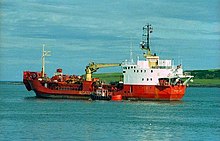
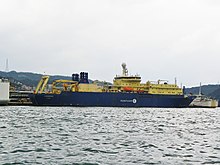
Alcatel Submarine Networks (ASN) is a provider of turnkey undersea network solutions. The business unit develops technology and offers installation services for optical submarine cable network links across the world's oceans.[231][232]
Previously, Alcatel-Lucent Submarine Networks, also became part of Nokia in 2016. Nokia and ASN had added another cable ship to the fleet called, CS Ile d'Ouessant.[233] The CS Ile d’Ouessant was purchased in 2019 and was originally built in 2011 as the CS Toisa Warrior.[234] Additionally, in 2021, Nokia and ASN requested two cable ships for the fleet, the CS Ile d'Yeu and CS Ile de Molène.[235]

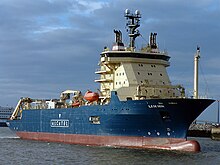
Here is a list of the cable-laying fleet from Alcatel (6), to Alcatel-Lucent (6[236] and 7), though Nokia (8):
- CS Ile d'Yeu (2001, 2021–Present) Built in 2001. Purchased in 2021 by Nokia ASN as two additional ships for a fleet of eight cable ships. (IMO 9230414)
- CS Ile d'Molène (2006, 2021–Present) Built in 2006. Purchased in 2021 by Nokia ASN two additional ships for a fleet of eight cable ships. (IMO 9329928)[235]
- CS Ile d’Ouessant (2011, 2019–Present) Built in 2011 as the CS Toisa Warrior. Purchased by Nokia ASN in 2019. (IMO 9427108)[237]
- CS Ile d'Aix (1992, 2011–Present) Built in 1992, as the cable ship, CS Gulmar Badaro. Purchased by Alcatel-Lucent in 2011, renaming the ship as CS Ile de AIX.[238]
- CS ile d' Brehat (2002–Present) Built in 2002. North route main lay of 4400 km for 2003 APOLLO route. Route clearance in 2015 for GTT Express.
- CS ile d' Sein (2001–Present) Built in 2001, Length: 140.36 m, Cable work in 2003 of routes Azores to Madeira and Madeira to Porto Santo.
- CS ile d' Batz (2001–Present) Built in 2001, 2003 APOLLO: Widemouth Bay, Bude, England to Brookhaven, USA and Lannion, France to Manasquan, USA, 2008 worked on TPE (Trans Pacific Express)[239]
- CS ile d' Re (1983–Present) Built in 1983, in 2006 worked on the APNG 2 cable route from Sydney, Australia to Port Moresby, Papua New Guinea. (OMS Group in August 2023 used MakaiLay software on ship, indication not part of ASN fleet.)[240]
- CS Stanelco 2 (1975, 2000-Unknown) Built in 1975, Constructed by Brattvag Skips. in Brattvag. Named coaster Siraholm. Renamed in 1982 by Standard Telefon og Kabelfabrik when converted to cable repair ship. Sold to Alcatel Contracting Norway A/S, Oslo in 2000. (IMO 7382469, MMSI 341082000) (NOT IN NOKIA FLEET COUNT AS OF 2021) (OMS Group in August 2023 used MakaiLay software on ship, indication not part of ASN fleet.)
- CS Peter Faber 3 (1981) Built in 1981, 2003, provided old cable recovery in the Atlantic with ile de Sein.[241] Optic Marine Services acquisition on 24 September 2019 of vessel continued ASN chartering the ship. (NOT IN NOKIA FLEET COUNT AS OF 2021) (Optic Marine Services Group in August 2023 used MakaiLay software on ship, indication not part of ASN fleet.)[240]
- CS Lodbrog (1985, 2000-Unknown) Built in 1985 as Spiegelberg and Tuzla. Later renamed in 1996 as Bolero.(IMO 8027808, MMSI: 354400000) Registered to Alcatel in 2000. (NOT IN NOKIA FLEET COUNT AS OF 2021) (OMS Group in August 2023 used MakaiLay software on ship, indication not part of ASN fleet.)[240]
- CS Heimdal (1983, 2000–2004) Built in 1983, 1988: Renamed FERRYMAR I. and reverted to MERCANDIAN ADMIRAL II. 2000: Converted to a repair and cable laying vessel and sold to Alcatel Submarine Networks Marine AS. 2003 performed repair of optical fiber in the Pacific Ocean, route between Japan and the United States, at almost 9,400 km deep.[242] 2004: Sold to SEACOR Smit Offshore (Worldwide) Ltd, (SEACOR Marine (Asia) Pte Ltd (IMO 8207393, MMSI: 538002126) (SOLD IN 2004, NOT IN ALCATEL-LUCENT FLEET AS OF 2015)
Corporate affairs
[edit]Business trends
[edit]The key trends for Nokia are (as of the financial year ending 31 December):[243][244][245]
| Revenue (€ bn) | Net profit (€ bn) | Total assets (€ bn) | Employees | |
|---|---|---|---|---|
| 2007 | 51.0 | 7.2 | 37.5 | 112,000 |
| 2008 | 50.7 | 3.9 | 39.5 | 125,000 |
| 2009 | 40.9 | 0.89 | 35.7 | 123,000 |
| 2010 | 42.4 | 1.8 | 39.1 | 132,000 |
| 2011 | 38.6 | −1.1 | 36.2 | 130,000 |
| 2012 | 30.1 | −3.1 | 29.9 | 97,700 |
| 2013 | 12.7 | −0.61 | 25.1 | 86,400 |
| 2014 | 12.7 | 3.4 | 21.0 | 57,500 |
| 2015 | 12.4 | 2.4 | 20.9 | 56,000 |
| 2016 | 23.6 | −0.76 | 44.9 | 101,000 |
| 2017 | 23.1 | −1.4 | 41.0 | 101,000 |
| 2018 | 22.5 | −0.34 | 39.5 | 103,000 |
| 2019 | 23.3 | 0.007 | 39.1 | 98,300 |
| 2020 | 21.8 | −2.5 | 36.1 | 92,000 |
| 2021 | 22.2 | 1.6 | 40.0 | 87,900 |
| 2022 | 24.9 | 4.2 | 42.9 | 86,800 |
| 2023 | 22.2 | 0.66 | 39.8 | 86,000 |
Corporate governance
[edit]The control and management of Nokia is divided among the shareholders at a general meeting and the Nokia Group Leadership Team (left),[246] under the direction of the board of directors (right).[247] The chairman and the rest of the Nokia Leadership Team members are appointed by the board of directors. Only the chairman of the Nokia Leadership Team can belong to both the board of directors and the Nokia Group Leadership Team. The Board of Directors' committees consist of the Audit Committee,[248] the Personnel Committee,[249] and the Corporate Governance and Nomination Committee.[250][251]
The operations of the company are managed within the framework set by the Finnish Companies Act,[252] Nokia's Articles of Association,[253] and Corporate Governance Guidelines,[254] supplemented by the board of directors' adopted charters. On 25 November 2019, Nokia announced that it would discontinue the role of Chief Operating Officer (COO) and distribute its functions to other company leaders. As a result, Chief Operating Officer Joerg Erlemeier decided to step down, effective 1 January 2020.[255]
Former corporate officers
[edit]| Name | Tenure |
|---|---|
| Björn Westerlund | 1967–1977 |
| Kari Kairamo | 1977–1988 |
| Simo Vuorilehto | 1988–1992 |
| Jorma Ollila | 1992–2006 |
| Olli-Pekka Kallasvuo | 2006–2010 |
| Stephen Elop | 2010–2014 |
| Rajeev Suri | 2014–2020 |
| Pekka Lundmark | Aug 2020 |
| Name | Tenure |
|---|---|
| Lauri J. Kivekäs | 1967–1977 |
| Björn Westerlund | 1977–1979 |
| Mika Tiivola | 1979–1986 |
| Kari Kairamo | 1986–1988 |
| Simo Vuorilehto | 1988–1990 |
| Mika Tiivola | 1990–1992 |
| Casimir Ehrnrooth | 1992–1999 |
| Jorma Ollila | 1999–2012 |
| Risto Siilasmaa | 2012–2020 |
| Sari Baldauf | 2020–current |
Stock
[edit]Nokia is a public limited liability company and is the oldest company listed under the same name on the Helsinki Stock Exchange, beginning in 1915.[257] Nokia has had a secondary listing on the New York Stock Exchange since 1994.[8][257] Nokia shares were delisted from the London Stock Exchange in 2003, the Paris Stock Exchange in 2004, the Stockholm Stock Exchange in 2007 and the Frankfurt Stock Exchange in 2012.[258] Due to the acquisition of Alcatel-Lucent in 2015, Nokia listed its shares again on the Paris Stock Exchange and was included in the CAC 40 index on 6 January 2016[259] but later removed on 18 September 2017.[260]
In 2007, Nokia had a market capitalization of €110 billion; by 17 July 2012 this had fallen to €6.28 billion, before increasing to €26.0 billion by 23 February 2015. Nokia's market cap at 2020 was 21.76 billion.
Corporate culture
[edit]Nokia's official corporate culture manifesto since the 1990s is called The Nokia Way.[261] It emphasizes the speed and flexibility of decision-making in a flat, networked organization.[262]
The official business language of Nokia is English. All documentation is written in English, and is used in official intra-company communication.
In 1992, Nokia adopted values that were defined with the key words respect, achievement, renewal and challenge.[263] In May 2007, the company redefined its values after initiating a series of discussion across its worldwide branches regarding what the new values of the company should be. Based on the employee suggestions, the new values were defined as: Engaging You, Achieving Together, Passion for Innovation and Very Human.[262] In August 2014, Nokia redefined its values again after the sale of its Devices business, using the original 1992 values again.
Headquarters
[edit]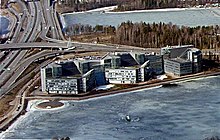
Nokia are based at Karaportti in Espoo, Finland, just outside capital Helsinki. It has been their head office since 2014 after moving from the purpose-built Nokia House in Espoo as part of the sale of the mobile phone business to Microsoft.[264] The building in Karaportti was previously the headquarters of NSN (now Nokia Networks).[265]
Awards and recognition
[edit]In 2018, Nokia received the Leading Lights award for most innovative cable/video product[266] and was named to Ethisphere's 2018 world's most ethical companies list.[267]
Logo history
[edit]-
Nokia Osakeyhtiö logo, 1865[268]
-
Nokia Osakeyhtiö logo, 1871[269]
-
Finnish Rubber Works (Suomen Kumitehdas) logo, 1965–1986
-
Nokia 'Arrows' logo, after merging with the Cable Factory (Kaapelitehdas) and Finnish Rubber Works (1966–1992). Used in advertising and products until c. 1997.
-
Nokia introduced its "Connecting People" advertising slogan in 1992, coined by Ove Strandberg.[270][271]
-
New slogan typeface (Nokia Sans font) introduced in 2005. Nokia Sans had been used by Nokia in products since 2002.[272]
-
The company stopped using a slogan within its logo in 2011. Logo used on Nokia-branded consumer devices including phones made by HMD Global.[273]
-
Current logo since 2023
-
History of Nokia's corporate typeface
Controversies
[edit]NSN's provision of intercept capability to Iran
[edit]In 2008, Nokia Siemens Networks, a joint venture between Nokia and Siemens AG, reportedly provided Iran's monopoly telecom company with technology that allowed it to intercept the Internet communications of its citizens.[274] The technology reportedly allowed Iran to use deep packet inspection to read and change the content of emails, social media, and online phone calls. The technology "enables authorities to not only block communication but to monitor it to gather information about individuals, as well as alter it for disinformation purposes".[275]
During the post-election protests in Iran in June 2009, Iran's Internet access was reported to have slowed to less than a tenth of its normal speeds, which experts suspected was due to using of deep packet inspection.[276]
In July 2009, Nokia began to experience a boycott of their products and services in Iran. The boycott was led by consumers sympathetic to the post-election protest movement and targeted companies deemed to be collaborating with the regime. Demand for handsets fell and users began shunning SMS messaging.[277]
Nokia Siemens Networks asserted in a press release that it provided Iran only with a "lawful intercept capability solely for monitoring of local voice calls" and that it "has not provided any deep packet inspection, web censorship, or Internet filtering capability to Iran".[278]
Nokia–Apple patent dispute
[edit]In October 2009, Nokia filed a lawsuit against Apple Inc. in the U.S. District Court of Delaware claiming that Apple infringed on 10 of its patents related to wireless communication including data transfer.[279] Apple was quick to respond with a countersuit filed in December 2009 accusing Nokia of 11 patent infringements. Apple's general counsel, Bruce Sewell went a step further by stating, "Other companies must compete with us by inventing their own technologies, not just by stealing ours." This resulted in a legal battle between the two telecom majors with Nokia filing another suit, this time with the U.S. International Trade Commission (ITC), alleging Apple had infringed its patents in "virtually all of its mobile phones, portable music players and computers".[280] Nokia went on to ask the court to ban all U.S. imports of the Apple products, including the iPhone, Macintosh and iPod. Apple countersued by filing a complaint with the ITC in January 2010.[279]
In June 2011, Apple settled with Nokia and agreed to an estimated one time payment of $600 million and royalties to Nokia.[281] The two companies also agreed on a cross-licensing patents for some of their patented technologies.[282][283]
Alleged tax evasion in India
[edit]Nokia's Indian subsidiary was charged in January 2013 with non-payment of Indian Tax Deducted at Source and transgressing transfer pricing norms in India.[284] The unpaid TDS of ₹30 billion, accrued during a course of six years, was due to royalty paid by the Indian subsidiary to its parent company.[285]
Nokia 7 Plus data breach
[edit]In March 2019, news broke that the company's Nokia 7 Plus phones were allegedly sending personal user data to China over several months. According to investigators, the gadget sent unencrypted data packages including geographical location, SIM card number, and the phone's serial number to an unidentified Chinese server every time that "the phone was turned on, the screen activated or unlocked."[286] The data was sufficient to follow the movements and actions of the phone in real time.[286]
Nokia brand owner HMD Global denied any such transfers had taken place, stating that it was instead the result of an error in the packing process of the phone's software.[287] The Finnish Office of the Data Protection Ombudsman launched an investigation into the matter on the assumption "that personal data has been transferred."[288]
Xinjiang region
[edit]In 2020, the Australian Strategic Policy Institute accused at least 82 major brands, including Nokia, of being connected to forced Uyghur labor in Xinjiang.[289]
See also
[edit]Notes
[edit]References
[edit]- ^ "Contact us". Nokia. Retrieved 17 September 2019.
- ^ "Nokia Annual Report 2023 (Form 20-F)". U.S. Securities and Exchange Commission. 29 February 2024.
- ^ a b "Nokia" (in Finnish). YTJ.fi. Archived from the original on 10 May 2013. Retrieved 2 March 2013.
- ^ a b "Report for Q4 and Full Year 2018" (PDF). Nokia Corporation. 21 March 2019. Archived from the original (PDF) on 27 May 2019. Retrieved 28 May 2019.
- ^ "Articles of Association of Nokia Corporation" (PDF). Nokia Corporation. Retrieved 8 June 2023.
- ^ a b c HS: Nokian juuret ovat Tammerkosken rannalla (in Finnish)
- ^ Morris, Iain. "Nokia has cut 11,000 jobs in effort to boost profit". Light Reading.
- ^ a b c "Nokia – FAQ". Nokia Corporation. Archived from the original on 8 February 2009. Retrieved 16 March 2009.
- ^ "Fortune Global 500 (100) – 2009 (Fortune ) – Ranking The Brands". Rankingthebrands.com. Retrieved 28 March 2019.
- ^ "Global 500 2016". Fortune. 2017. Archived from the original on 10 May 2019. Retrieved 24 August 2017.
- ^ "Euro Stoxx 50". Boerse-frankfurt.de. Retrieved 24 August 2017.
- ^ a b "This is the new Nokia". The Verge. 18 November 2014. Retrieved 23 November 2014.
- ^ "Full Text: Nokia CEO Stephen Elop's 'Burning Platform' Memo". The Wall Street Journal. 9 February 2011. Archived from the original on 11 February 2011.
- ^ Sampsa Kurri (11 October 2012), The story of Nokia MeeGo, archived from the original on 16 October 2012
- ^ Thom Holwerda (11 October 2012). "The story of Nokia's Maemo and MeeGo". OS News.
- ^ "Microsoft buys Nokia's Devices and Services Unit, unites Windows Phone 8 and its hardware maker". The Verge. 2 September 2013. Retrieved 3 September 2013.
- ^ Ovide, Shira. "Microsoft in $7.17 Billion Deal for Nokia Cellphone Business". The Wall Street Journal. Retrieved 3 September 2013.
- ^ "Microsoft closes Nokia deal, pays more than expected". CNET.
- ^ Coupland, Douglas. "The Ghost of Invention: A Visit to Bell Labs". Wired.
- ^ "How Nokia reinvented itself". CNNMoney Switzerland. Archived from the original on 24 October 2018. Retrieved 28 March 2019.
- ^ "Nokia celebrates first day of combined operations with Alcatel-Lucent". Nokia. Archived from the original on 16 January 2016. Retrieved 15 January 2016.
- ^ "Nokia plans to acquire Withings to accelerate entry into Digital Health". 26 April 2016. Archived from the original on 19 May 2016. Retrieved 1 June 2016.
- ^ Best, Jo. "'Mobile phones are our history, not our future': Nokia on where next for hardware". ZDNet. Retrieved 28 March 2019.
- ^ Scott Barr, Chris (18 May 2016). "Microsoft sells Nokia brand use to Foxconn and HMD global". SlashGear. Retrieved 16 May 2017.
- ^ "Nokia's key to success: A strong portfolio combined with aggressive licensing – Filing Analytics". Filinganalytics.io. Retrieved 28 March 2019.
- ^ "Ericsson, Samsung gain share in network gear as ZTE slumps". Reuters.com. 23 August 2018. Archived from the original on 28 March 2019. Retrieved 28 March 2019.
- ^ Vilpponen, Antti (4 September 2013). "Nokia: Finland mourns the demise of its proud tech heritage". The Guardian.
- ^ Kelly, Gordon. "Finland and Nokia: an affair to remember". Wired UK.
- ^ Bloomberg (4 September 2013). "Finland mourns loss of national icon Nokia".
- ^ "Start01". Gasmasklexikon.com. Retrieved 23 November 2016.
- ^ "U.S. Threatened to Block Finnish Arms Deal Over High-Tech Exports in 1980's". Yle Uutiset. 3 January 2009.
- ^ "COMPANY NEWS; Nokia Oy Buys Stake in Ericsson". The New York Times. Reuters. 21 January 1988. ISSN 0362-4331. Retrieved 14 August 2017.
- ^ "Nokia's Secret Code Perhaps the least hierarchical big company in the world, Nokia has been winning big in wireless. But its Finnish recipe for innovation is about to be put to the test. – May 1, 2000". Fortune (magazine).
- ^ "Nokia´s Pioneering GSM Research and Development to be Awarded by Eduard Rhein Foundation". Nokia.
- ^ "Nokia Announces Heads of Agreement to Sell Its Remaining Television Business". Nokia.
- ^ "Nokia Announces Final Sale of its Television Manufacturing Business". Nokia.
- ^ "Nokia First to Launch Digital Satellite Receiver in The UK". Nokia.
- ^ "Nokia launches the World's first Digital IRD With 'Common Interface'". Nokia.
- ^ "Nokia is chosen supplier to British Digital Broadcasting". Nokia.
- ^ "Nokia to invest about FIM 1 billion in mobile phone production in Bochum, Germany". Nokia.
- ^ "Nokia manufactures its 100 millionth mobile phone". Nokia.
- ^ Oremus, Will (20 September 2016). "The 1999 Handset That Finally Made Cellphones Cool". Slate. Retrieved 28 March 2019.
- ^ "Mobile phone history". Mobilephonehistory.co.uk. Retrieved 28 March 2019.
- ^ "Nokia fashion phones". Mobilephonehistory.co.uk. Retrieved 28 March 2019.
- ^ "Nokia Builds on "Media-Ready" Monitor Series with New 21" Line". Nokia.
- ^ "Nokia to move wireless LAN products toward mass market". Nokia.
- ^ "ViewSonic Corporation Acquires Nokia Display Products' Branded Business". Nokia.
- ^ "Nokia to supply Telefónica with ADSL modems in Spain". Nokia.
- ^ "Nokia acquired Gradient's share in Brazilian manufacturing joint venture NGI". Retrieved 21 January 2021.
- ^ "Nokia to acquire Psion plc's shares in Symbian". Nokia.
- ^ "Nokia to acquire Symbian Limited to enable evolution of the leading open mobile platform". Nokia.
- ^ "Nokia supplies WAP technology to Thus in UK". Nokia.
- ^ "Nokia: 'Best is yet to come'". BBC News. 5 December 2000. Retrieved 28 March 2019.
- ^ Silberman, Steve (1 September 1999). "Just Say Nokia". Wired. Retrieved 28 March 2019.
- ^ Monaghan, Angela (3 September 2013). "Nokia: the rise and fall of a mobile phone giant". The Guardian. Retrieved 28 March 2019.
- ^ Hiscock, Jennifer (1 March 2001). "Most Trusted Brands: Winning the trust of consumers is the key to lasting brand success. Jennifer Hiscock takes a look at the UK's most respected brands". Campaign. Retrieved 14 August 2023.
- ^ "Nokia and Carl Zeiss join forces to offer enhanced imaging for camera phone users". Nokia.
- ^ "Nokia launches Nokia Nseries branded multimedia device range". Nokia.
- ^ "Nokia N95 Wins Prestigious TIPA Award 2007". Nokia.
- ^ "It's what cameras have become – the new Nokia N82". Nokia.
- ^ "Nokia N82 wins renowned TIPA 'Best Mobile Imaging Device in Europe' Award 2008". Nokia.
- ^ "Nokia Introduces the Next Story in Video with the Nokia N93". Nokia.
- ^ "New Nokia Lumia Range Delivers Latest PureView Camera Innovation, New Navigation Experiences and Wireless Charging on Windows Phone 8". Nokia.
- ^ "Nokia N-Gage (TM) mobile game deck – the revolutionary gaming experience". Nokia.
- ^ "Nokia's Ilkka slams Game Boy Advance". 12 June 2003.
- ^ "Get out and play – with N-Gage games in your Nokia device". Nokia.
- ^ Milner, Mark (17 April 2004). "Nokia losing market share". The Guardian. Retrieved 28 March 2019.
- ^ Schofield, Jack (27 November 2007). "Nokia increases market share in mobile phone business". The Guardian. Retrieved 28 March 2019.
- ^ "Nokia and Motorola gain market share as arena grows – Technology & Media – International Herald Tribune". The New York Times. 22 November 2006. Retrieved 28 March 2019.
- ^ Smith, Tony (24 January 2008). "Nokia grabs 40% of phone market for first time". The Register. Retrieved 28 March 2019.
- ^ "Report: Nokia's smartphone market share dropping". FierceWireless. 11 March 2009. Retrieved 28 March 2019.
- ^ Tofel, Kevin C. (11 March 2009). "Winners and Loser in the Smartphone Market: Q4 2008". devicehd.com. Retrieved 28 March 2019.
- ^ "Live Mobile TV broadcasts for the first time at an international sporting event". Nokia.
- ^ "Mobile TV trial goes live in UK". Nokia.
- ^ "Nokia moves forward with management succession plan". Nokia.
- ^ "Meet Ovi, the door to Nokia's Internet services". Nokia.
- ^ "84 percent of Nokia Ovi store app developers say Apple's store is better". VentureBeat.
- ^ "Nokia to end phone sales in Japan". BBC News. 27 November 2008.
- ^ Wood, David; West, Joel (11 June 2013). Evolving an Open Ecosystem: The Rise and Fall of the Symbian Platform. Emerald Group Publishing. p. 35. ISBN 978-1-78190-826-6.
- ^ Modine, Austin (31 October 2008). "Nokia's Trolltech Qt Software previews cross-platform IDE". The Register. Retrieved 28 March 2019.
- ^ Halliday, Josh; agencies (9 August 2012). "Nokia sells its Qt software business". The Guardian. Retrieved 28 March 2019.
- ^ a b Andrew, Orlowski (2 August 2011). "Nokia ditches letters for all-number names". The Register. Retrieved 28 March 2019.
- ^ "Nokia N8. Connect. Create. Entertain". Nokia.
- ^ "Nokia delays flagship N8 again". Reuters.com. 21 September 2010.
- ^ Wearden, Graeme (10 September 2010). "Nokia replaces Kallasvuo with Microsoft's Elop". The Guardian.
- ^ "Nokia's new chief commits to Finnish culture". Financial Times. 12 September 2010. Archived from the original on 10 December 2022. Retrieved 28 March 2019.
- ^ "Nokia Board Chair Jorma Ollila reveals plans to step down in 2012". SlashGear.com. 13 September 2010. Retrieved 28 March 2019.
- ^ "Nokia pays big bucks for Elop: Former Microsoft executive receives $6M signing bonus". GeekWire. 11 March 2011. Retrieved 11 March 2011.
- ^ "Symbian OS Now Fully Open Source". PC World. Archived from the original on 4 July 2017. Retrieved 21 July 2017.
- ^ "Nokia reaffirms commitment to Symbian platform". Nokia.
- ^ "Will Nokia build Windows phones?". Venturebeat.com. 23 September 2010. Retrieved 28 March 2019.
- ^ "Anssi Vanjoki on quitting Nokia: 'I didn't become the CEO. It is as simple as that'". Engadget. 23 September 2010. Retrieved 28 March 2019.
- ^ "Nokia World 2010 live coverage: Nokia E7, C7, C6, N8, C3". GSMArena.com. Retrieved 28 March 2019.
- ^ "Nokia and Microsoft form partnership". BBC News. 11 February 2011. Retrieved 16 December 2018.
- ^ Weintraub, Seth (8 February 2011). "Nokia's Elop drops bomb: the platform is on fire". CNN. Archived from the original on 27 June 2013. Retrieved 14 June 2013.
- ^ Latest Video (1 June 2011). "Nokia CEO Stephen Elop Chooses Microsoft Windows Phone OS Over Android – John Paczkowski – D9". AllThingsD. Retrieved 14 June 2013.
- ^ Technica, Ars (24 June 2011). "Why Nokia's N9 Smartphone Is Set Up for Failure". Wired. Retrieved 28 March 2019.
- ^ Savov, Vlad (9 May 2013). "Nokia hedges its commitment to Windows Phone with new Asha platform and $99 phone". The Verge. Retrieved 28 March 2019.
- ^ Cord, David J. (April 2014). The Decline and Fall of Nokia. Schildts & Söderströms. p. 217. ISBN 978-951-52-3320-2.
- ^ Andrew, Orlowski (21 July 2011). "Nokia posts massive loss, blames 'ambiguity'". The Register. Retrieved 28 March 2019.
- ^ Bofah, Kofi (9 July 2012). "Nokia Is Finnished: Prepare For Bankruptcy". Seekingalpha.com. Retrieved 1 June 2016.
- ^ "And Now Nokia Has A New Problem -- It Might Go Bankrupt". Business Insider. Retrieved 1 June 2016.
- ^ "Foundering Nokia pushes 10,000 bods, 3 veeps overboard". The Register.
- ^ "Finnish Government Hangs Up on Nokia". Wired.
- ^ Andrew, Orlowski (5 October 2011). "Meltemi is real – Nokia's skunkworks Linux". The Register. Retrieved 28 March 2019.
- ^ TechCrunch (30 October 2011). "Nokia: A Look At The Global Battle Over Mobile Advertising". Seeking Alpha. Retrieved 28 March 2019.
- ^ "Why Nokia can't crack the U.S. market – Sep. 16, 2010". CNN. Retrieved 28 March 2019.
- ^ "CES: Nokia looks to crack US market with Lumia 900 – V3". V3.co.uk. 10 January 2012. Retrieved 28 March 2019.
- ^ Koh, Damian. "Nokia unveils new typeface, Pure". CNET. Retrieved 28 March 2019.
- ^ H, Victor (August 2011). "Nokia changes its naming system again: goes back to pure numbers". Phone Arena. Retrieved 28 March 2019.
- ^ "Video: Stephen Elop interviewed by YLE on Positive Nokia Lumia 920 feedback". My Nokia Blog. 18 December 2012.
- ^ "Nokia Lumia Sales Strong, Asha Stronger". InformationWeek.
- ^ "Nokia Had A Stunning Q3 In North America, With Device Volume Up 367% From Last Year". TechCrunch. 29 October 2013. Retrieved 28 March 2019.
- ^ "Nokia shares fall after sales drop". BBC. 18 April 2013.
- ^ "Jorma Ollila resigns as Nokia chairman after 13 years". Bangkok Post. Retrieved 28 March 2019.
- ^ "The acquisition of Nokia: Steve Ballmer's last hurrah?". MicroscopeUK.
- ^ a b "Operation Elop". Asokan.org. Retrieved 28 March 2019.
- ^ a b "Jorma Ollila brought Nokia great success. But did he also bring the company down? The former phone giant's current chairman Risto Siilasmaa tells us what he witnessed". Helsingin Sanomat. 28 September 2018. Retrieved 28 March 2019.
- ^ "Why Microsoft really bought Nokia". BetaNews.com. 5 September 2013. Retrieved 28 March 2019.
- ^ Carlson, Nicholas. "Analysts: Microsoft Bought Nokia Because Nokia Was Going To Stop Making Windows Phones". Business Insider. Retrieved 28 March 2019.
- ^ Warren, Tom (25 February 2014). "Why is Nokia making Android phones?". The Verge. Retrieved 28 March 2019.
- ^ Warren, Tom (24 February 2014). "This is Nokia X: Android and Windows Phone collide". The Verge. Retrieved 28 March 2019.
- ^ Thurrottfeed (25 September 2017). "Satya Nadella Admits He Was Against Nokia Acquisition". Thurrott.com. Retrieved 28 March 2019.
- ^ "Gates and Nadella opposed Microsoft's Nokia acquisition". Alphr. Archived from the original on 28 March 2019. Retrieved 28 March 2019.
- ^ Weinberger, Matt. "Microsoft CEO Satya Nadella says he voted against Steve Ballmer's $7.6 billion Nokia mistake". Business Insider. Retrieved 28 March 2019.
- ^ "Best Global Brands – 2014 (Interbrand) – Ranking The Brands". Rankingthebrands.com.
- ^ "Best Global Brands – 2009 (Interbrand) – Ranking The Brands". Rankingthebrands.com.
- ^ Kim, Ryan (11 February 2011). "What the Web Is Saying: Nokia Partners With Microsoft". Gigaom.com. Archived from the original on 28 March 2019. Retrieved 28 March 2019.
- ^ Troianovski, Anton; Grundberg, Sven (19 July 2012). "Nokia's Bad Call on Smartphones". The Wall Street Journal. Retrieved 28 March 2019.
- ^ "Apple Vs. Nokia: The Smartphone Rivalry". Theglobalist.com. 9 August 2010. Retrieved 28 March 2019.
- ^ "The Strategic Decisions That Caused Nokia's Failure". INSEAD Knowledge. 23 November 2017. Retrieved 28 March 2019.
- ^ "Nokia Bureaucracy Stifled Innovation, Ex-Managers Say". HuffPost. 27 November 2010. Retrieved 28 March 2019.
- ^ "Inside Nokia: rebuilt from within". Financial Times. 13 April 2011. Archived from the original on 10 December 2022. Retrieved 28 March 2019.
- ^ "Nokia has a "Soviet-like" bureaucracy that stifles innovation". Geek.com. 28 September 2010. Archived from the original on 28 March 2019. Retrieved 28 March 2019.
- ^ "Nokia buys out, renames Nokia Siemens Networks". PC World. 7 August 2013. Retrieved 1 June 2016.
- ^ "Nokia renames NSN as Networks – TeleAnalysis". Teleanalysis.com. Archived from the original on 4 June 2016. Retrieved 1 June 2016.
- ^ Souppouris, Aaron (24 January 2013). "Nokia finally reports profit after six quarters of losses". The Verge. Retrieved 1 June 2016.
- ^ "Nokia To Focus On Here Maps And Network Equipment After Microsoft Sale". Techweekeurope.co.uk. 7 October 2013. Retrieved 1 June 2016.
- ^ "Nokia, China Mobile sign $970 million framework deal" (Press release). Reuters. 10 October 2014. Archived from the original on 24 September 2015. Retrieved 1 July 2017.
- ^ "Nokia looks to resurrect its valuable brand on future devices". The Verge. 17 November 2014. Retrieved 18 November 2014.
- ^ "Nokia's first device after Microsoft is an iPad mini clone that runs Android". The Verge. 18 November 2014. Retrieved 18 November 2014.
- ^ "Nokia CEO says the company will design and license phones again". Engadget. 19 June 2015. Retrieved 3 August 2015.
- ^ "Other statements". Nokia. Archived from the original on 2 June 2015. Retrieved 20 November 2015.
- ^ "Back to the future: Nokia prepares for mobile comeback". Reuters. 10 August 2015. Archived from the original on 21 November 2015. Retrieved 20 November 2015.
- ^ "Nokia: We'll return to the mobile phone market in 2016 – TheINQUIRER". Theinquirer.net. Archived from the original on 21 June 2015. Retrieved 1 June 2016.
- ^ Newton, Casey (29 July 2015). "Nokia reveals Ozo, a futuristic new camera for filming virtual reality". The Verge. Retrieved 1 June 2016.
- ^ "Nokia makes comeback with OZO virtual reality camera". Wired UK. Archived from the original on 13 March 2016. Retrieved 1 June 2016.
- ^ Schroeder, Stan (December 2015). "Nokia's $60,000 virtual reality camera is now available for pre-order". Mashable.com. Retrieved 1 June 2016.
- ^ "Nokia drops the price of its Ozo virtual reality camera by $15K". Digital Trends. 18 August 2016. Retrieved 22 May 2017.
- ^ "Nokia OZO | Buy OZO online from the official Nokia store". Nokia. Archived from the original on 18 March 2017. Retrieved 22 May 2017.
- ^ Schechner, Sam (14 April 2015). "Nokia Is in Talks to Buy Alcatel-Lucent". The Wall Street Journal. Retrieved 14 April 2015.(subscription required)
- ^ a b Byford, Sam (15 April 2015). "Nokia agrees to buy Alcatel-Lucent for $16.6 billion". The Verge. Retrieved 15 April 2015.
- ^ "Alcatel acquisition will boost 5G plans, says Nokia CEO". CNN-IBN. Archived from the original on 22 November 2015. Retrieved 20 November 2015.
- ^ Simnikiwe Mzekandaba, iTWeb. "Nokia, Alcatel-Lucent deal nears completion." 23 November 2015. 30 November 2015.
- ^ Editorial. "Ericsson reports fifth straight quarter in the red". Reuters U.K. Retrieved 31 January 2018.
The company faces mounting competition from China's Huawei and Finland's Nokia as well as weak emerging markets and falling spending by telecoms operators for which purchases of next-generation 5G technology are still years away.
[dead link] - ^ Simon Zekaria and Ryan Knutson, The Wall Street Journal. "Merger of Nokia With Alcatel-Lucent Could Put Pressure on Prices." 14 April 2015. Retrieved 29 January 2016.
- ^ Daniel Thomas, Financial Times. "Nokia-Alcatel Lucent deal wins approval of Chinese regulator." 19 October 2015. 19 October 2015.
- ^ "Alcatel's strategic undersea cables unit to be swallowed by Nokia". Reuters. 7 October 2015. Archived from the original on 21 November 2015. Retrieved 20 November 2015.
- ^ Peter Dinham, iTWire. "Nokia, Alcatel-Lucent acquisition closes." 18 January 2016. Retrieved 29 January 2016.
- ^ "Nokia sells Here maps business to carmakers Audi, BMW and Daimler". CNET. Retrieved 3 August 2015.
- ^ Lunden, Ingrid. "Nokia Closes Its $2.8B Sale Of Here To The Audi, BMW And Daimler Car Consortium". TechCrunch. Retrieved 1 June 2016.
- ^ By Matthias Verbergt and Sam Schechner, The Wall Street Journal. "Nokia Has Designs on a Healthier Future With Purchase of Fitness Gadgets Startup." 26 April 2016. Retrieved 27 April 2016.
- ^ Falcone, John (31 May 2015). "It's official: Nokia owns Withings". CNET. Retrieved 1 June 2016.
- ^ O'Brien, Chris (31 May 2018). "Withings co-founder Éric Carreel finalizes deal to regain control from Nokia". VentureBeat.com. Retrieved 23 October 2018.
- ^ "Microsoft sells Nokia feature phones business". BBC News. Retrieved 2 May 2017.
- ^ "Nokia 6 Announced: Qualcomm Snapdragon 430, 5.5-Inch Display Android 7". Anandtech. Retrieved 2 May 2017.
- ^ "Report: HMD to resurrect legendary Nokia 3310 at Mobile World Congress". Ars Technica. 14 February 2017. Retrieved 2 May 2017.
- ^ James Titcomb (18 February 2017). "Nokia 3310 relaunch: Why we still love the phone that defined the Nokia era". The Telegraph. Archived from the original on 11 January 2022. Retrieved 8 March 2017.
- ^ "Nokia 2020 Annual Report reveals company's ownership interest in HMD Global, the maker of Nokia smartphones and more | Nokiamob". 6 March 2021. Retrieved 8 March 2023.
- ^ "Nokia demonstrates world's first 5G-ready network". Nokia.
- ^ "Nokia carries out 5G connection using 5GTF standards". 15 February 2017.
- ^ "Nokia and Xiaomi sign business cooperation and patent agreements". 5 July 2017. Retrieved 5 July 2017.
- ^ "Nokia jumps from 335th to 188th place on Brand Finance list for 2017". Nokiamob.net. 1 February 2018.
- ^ "Nokia signs its first official 5G equipment deal with NTT DoCoMo". Reuters.com. 19 January 2018.
- ^ Tung, Liam. "Nokia's new ReefShark chipset aims to deliver big 5G performance boost – ZDNet". ZDNet.
- ^ "Finnish government acquires stake in Nokia". TechRadar. Retrieved 24 March 2018.
- ^ Auchard, Eric. "Nokia acquires U.S. software supplier SpaceTime Insight". U.S. Retrieved 7 May 2018.
- ^ Blatchford, Andy (24 January 2019). "Canada strikes 5G wireless research deal with Nokia". The Globe and Mail. Retrieved 27 January 2019.
- ^ Kastrenakes, Jacob (2 September 2019). "Nokia is better than Samsung at timely Android updates, study says". The Verge. Retrieved 2 September 2019.
- ^ Toh, Michelle (2 March 2020). "Nokia names new CEO after missing 5G opportunity". CNN Business. Retrieved 2 March 2020.
- ^ "Nokia completes acquisition of Elenion Technologies" (25 March 2020). Nokia.com. Retrieved 9 June 2020.
- ^ "Comeback of Nokia – The Phoenix That Rose From Its Ashes". MarketsCombined. 3 November 2020. Archived from the original on 4 November 2020. Retrieved 6 November 2020.
- ^ Mukherjee, Supantha (29 June 2020). "Nokia wins Taiwan Mobile 5G contract worth $450 million". Platform Executive. Retrieved 29 June 2020.
- ^ Browne, Ryan (19 October 2020). "NASA is launching a 4G mobile network on the moon". CNBC. Retrieved 19 October 2020.
- ^ Goldman, David (19 October 2020). "NASA and Nokia are putting a 4G network on the moon". CNN. Retrieved 20 October 2020.
- ^ "Nokia to launch various phones with Android Go". Pro Magazine. 23 November 2020. Retrieved 23 November 2020.
- ^ "Flipkart partners with Nokia to launch new air conditioners in India". Hindustan Times. 21 December 2020. Retrieved 22 December 2020.
- ^ Mukherjee, Supantha (12 April 2022). "Nokia to stop doing business in Russia". Reuters. Retrieved 12 April 2022.
- ^ Mukherjee, Supantha (26 February 2023). "Nokia changes iconic logo to signal strategy shift". The Star.
- ^ Lindeberg, Rafaela (27 February 2023). "Nokia redesigns logo because people think it still makes mobile phones". The Star.
- ^ "Nokia Rebrand". Lippincott. Archived from the original on 27 February 2023. Retrieved 28 February 2023.
- ^ "Nokia to acquire Fenix Group, strengthening wireless offering in the Defense segment". Yahoo Finance. 12 December 2023. Retrieved 12 December 2023.
- ^ Sensi, Jasdip (21 December 2023). "Nokia sells device management business to Lumine for £160m". Mobile Marketing Magazine. Retrieved 21 April 2024.
- ^ "Lumine Group Completes the Purchase of the Device Management and Service Management Platform Businesses from Nokia". luminegroup.com. 1 April 2024. Retrieved 21 April 2024.
- ^ Chopping, Dominic (26 February 2024). "Nokia Brings Forward Net Zero Target by 10 Years to 2040". The Wall Street Journal. News Corp. Retrieved 27 February 2024.
- ^ "Nokia to buy networking company Infinera in US$2.3 billion deal". The Business Times. 28 June 2024. Retrieved 27 June 2024.
- ^ Kapanen, Ari (24 July 2007). "Ulkomaalaiset valtaavat pörssiyhtiöitä" (in Finnish). Taloussanomat. Retrieved 14 May 2008.
- ^ "Nokia is no longer Finland's most valuable company". phonearena.com. 4 April 2012.
- ^ Ali-Yrkkö, Jyrki (2001). "The role of Nokia in the Finnish Economy" (PDF). ETLA (The Research Institute of the Finnish Economy). Archived from the original (PDF) on 24 October 2007. Retrieved 21 March 2009.
- ^ Ali-Yrkkö, Jyrki (2010). "NOKIA AND FINLAND IN A SEA OF CHANGE" (PDF). ETLA – Research Institute of the Finnish Economy. Archived from the original (PDF) on 25 April 2012. Retrieved 12 November 2011.
- ^ "Trump team idea to nationalize 5G network to counter China is rejected". Reuters. 29 January 2018.
The rules for 5G networks are still being worked out by industry players. The work has been complicated by an effective ban in the United States on two of the largest firms, Chinese suppliers Huawei Technologies Co Ltd [HWT.UL] and ZTE Corp since a 2012 investigation over links to potential Chinese spying, something the companies have denied.
- ^ "Nokia Siemens Networks Fact Sheet" (PDF). Nokia Siemens Networks. Archived from the original (PDF) on 18 July 2007. Retrieved 9 July 2007.
- ^ "Structure". Nokia Corporation. 1 October 2009. Archived from the original on 8 October 2009. Retrieved 28 December 2009.
- ^ "The Wave of the Future". Brand New: Opinions on Corporate and Brand Identity Work. UnderConsideration LLC. 25 March 2007. Retrieved 14 May 2008.
"Reviews – 2007 – Nokia Siemens Networks". Identityworks. 2007. Archived from the original on 6 August 2013. Retrieved 14 May 2008. - ^ Juhana Rossi (1 July 2013). "Nokia Pays $2.21 Billion for Siemens Stake in NSN". The Wall Street Journal. Retrieved 18 December 2013.
- ^ "Our businesses". Nokia. Archived from the original on 16 April 2015. Retrieved 15 April 2015.[self-published source]
- ^ "Why invent with us?". Nokia. Retrieved 15 April 2015.[self-published source]
- ^ Tom Warren (18 November 2014). "Nokia's first device after Microsoft is an iPad mini clone that runs Android". The Verge. Retrieved 18 March 2015.
- ^ "Nokia OZO | Discover | For the best VR production experience". Nokia. Archived from the original on 10 June 2016. Retrieved 8 February 2017.
- ^ "Nokia OZO | Blog". Nokia. Retrieved 8 February 2017.
- ^ "Nokia updated OZO Player SDK to 1.4.0 | Nokiamob". 5 November 2017. Retrieved 7 August 2024.
- ^ Reuters. "Head of Technologies unit to leave Nokia." 31 August 2016. Retrieved 2 September 2016.
- ^ "Brad Rodrigues, Interim President of Nokia Technologies". Nokia. Retrieved 22 May 2017.
- ^ "The new President of Nokia Technologies is Gregory Lee, former CEO at Samsung". Phonearena.com. 30 June 2017.
- ^ "Nokia unveils plans for new state-of-the-art research and development facility for Nokia Bell Labs in New Brunswick, New Jersey technology hub". globenewswire.com (Press release). Nokia Oyj. 11 December 2023. Retrieved 11 December 2023.
- ^ Natasha Lomas (29 January 2013). "Nokia Growth Partners Launches Third Fund Backed By $250M From Nokia, Expands In China". Tech Crunch. Retrieved 22 October 2014.
- ^ "Nokia Growth Partners raises USD 350 million investment fund for investments in Internet of Things – Nokia". Nokia.com.
- ^ "Nokia Venture Partners Becomes Bluerun Ventures; Announces 1st Closing Of $350 Million Fund – Nokia". Nokia.com.
- ^ Shen, Xinmei (13 September 2023). "US VC firm BlueRun's China arm ditches Silicon Valley brand, following Sequoia". South China Morning Post. Retrieved 3 December 2024.
- ^ "Introducing NGP Capital". NGP Capital. Retrieved 2 December 2017.
- ^ Duffy, Jim (23 September 2015). "Is Nuage really key to Nokia?". Networkworld.com.
- ^ "Nuage Networks Gets Some Love From Nokia". Sdxcentral.com.
- ^ Scott, Bicheno (10 May 2017). "Nokia's Nuage Networks scores Telefónica SD-WAN win". Telecoms.com.
- ^ "Vodafone signs Nokia's Nuage Networks to boost SD-WAN efforts". Rcrwireless.com. 14 March 2017.
- ^ "Nuage Networks to Contribute Technology for BT's future SD-WAN Services – Nuage Networks". Nuagenetwroks.net. 10 November 2016.
- ^ "China Mobile Picks Nuage Networks SDN for Public Cloud". Sdxcentral.com.
- ^ "Nuage Networks Wins SDN Deal with Large Chinese Enterprise". Sdxcentral.com.
- ^ "Management Team – Nuage Networks". Nuagenetworks.net.
- ^ "Nokia's new Android smartphone has been unveiled". The Verge. Retrieved 13 March 2018.
- ^ "Meet HMD Global, the Team Bringing Nokia Phones Back". NDTV Gadgets360.com. Retrieved 13 March 2018.
- ^ "Ekinops acknowledges talks with Nokia on possible purchase of Alcatel Submarine Networks". Lightwaveonline.com. 22 October 2018. Retrieved 23 October 2018.
- ^ "Submarine Network Solutions". Nokia Networks. 27 January 2013. Archived from the original on 24 October 2018. Retrieved 23 October 2018.
- ^ "Who we are". web.asn.com. Alcatel Submarine Networks. 5 October 2023. Retrieved 2 December 2023.
- ^ "ALCATEL SUBMARINE NETWORKS REJUVENATES ITS FLEET BY ACQUIRING ILE D'OUESSANT, A NEW MAINTENANCE VESSEL". web.asn.com. Alcatel Submarine Networks. Archived from the original on 5 February 2024. Retrieved 2 December 2023.
- ^ a b "ASN Adds Two More Vessels To Their Fleet". subtelforum.com. Submarine Telecom Forum. 29 June 2021. Retrieved 2 December 2023.
- ^ "Who we are". web.asn.com. Alcatel Submarine Systems. 5 October 2023. Retrieved 2 December 2023.
- ^ Maillet, Jeremie. "ILE D'OUESSANT". web.asn.com. Alcatel Submarine Networks. Archived from the original on 28 March 2023. Retrieved 2 December 2023.
- ^ "GULMAR BADARO - IMO 9009310". shipspotting.com. Ship Spotting. Retrieved 2 December 2023.
- ^ Meyer, David. "Aboard an Alcatel-Lucent undersea cable ship (photos)". CNET. Retrieved 7 December 2023.
- ^ a b c Kugeler, Hermann (24 August 2023). "OMS Group Commissions Makai Software Across Their Installation and Repair Fleet". subtelforum.com. Submarine telecoms Forum. Retrieved 7 December 2023.
- ^ "Alcatel Completes Submarine Projects". lightreading.com. LightReading. Retrieved 2 December 2023.
- ^ "Alcatel breaks world record in deep-sea cable repairs in the Pacific Ocean". Lightwave. 23 June 2003. Retrieved 7 December 2023.
- ^ "Nokia Fundamentalanalyse | KGV | Kennzahlen". boerse.de (in German). Retrieved 22 July 2024.
- ^ "Nokia Key Figures 2007-2014". 4 January 2016. Archived from the original on 4 January 2016. Retrieved 22 July 2024.
- ^ "Nokia Key Figures 2013-2020". 27 June 2022. Archived from the original on 27 June 2022. Retrieved 22 July 2024.
- ^ "Nokia Group Leadership Team". Nokia Corporation. May 2015. Archived from the original on 1 May 2014. Retrieved 1 April 2015.
- ^ "Meet the Board". Nokia Corporation. 2015. Retrieved 29 May 2020.
- ^ "Audit Committee Charter at Nokia" (PDF). Nokia Corporation. 2007. Archived from the original (PDF) on 28 May 2008. Retrieved 14 May 2008.
- ^ "Personnel Committee Charter at Nokia" (PDF). Nokia Corporation. 2007. Archived from the original (PDF) on 28 May 2008. Retrieved 14 May 2008.
- ^ "Corporate Governance and Nomination Committee Charter at Nokia" (PDF). Nokia Corporation. 2008. Archived from the original (PDF) on 28 May 2008. Retrieved 14 May 2008.
- ^ "Committees of the Board". Nokia Corporation. May 2007. Retrieved 14 May 2008.
- ^ Virkkunen, Johannes (29 September 2006). "New Finnish Companies Act designed to increase Finland's competitiveness" (PDF). LMR Attorneys Ltd. (Luostarinen Mettälä Räikkönen). Archived from the original (PDF) on 3 March 2012. Retrieved 14 May 2008.
- ^ "Articles of Association of Nokia Corporation" (PDF). Nokia Corporation. Archived from the original (PDF) on 26 June 2015. Retrieved 26 June 2015.
- ^ "Corporate Governance Guidelines at Nokia" (PDF). Nokia Corporation. 2006. Archived from the original (PDF) on 28 May 2008. Retrieved 14 May 2008.
- ^ "Nokia to discontinue Chief Operating Officer role; current COO Joerg Erlemeier to leave company". Nokia.
- ^ "Suomalaisten yritysten ylin johto" (in Finnish). Archived from the original on 27 November 2016. Retrieved 29 May 2020.
- ^ a b c "Nokia – Towards Telecommunications" (PDF). Nokia Corporation. August 2000. Archived from the original (PDF) on 10 July 2009. Retrieved 5 June 2008.
- ^ "Nokia applies for delisting from the Frankfurt Stock Exchange". marketwired.com. 24 November 2011. Archived from the original on 1 December 2017. Retrieved 24 November 2017.
- ^ "Nokia announces settlement of its public exchange offer for Alcatel-Lucent securities, the registration of new shares and its inclusion in the CAC 40 index". Globenewswire.com (Press release). 7 January 2016. Retrieved 1 June 2016.
- ^ "Euronext to remove Nokia from CAC 40 index, include STMicroelectronics". Reuters.com. Reuters. 7 September 2017.
- ^ "Newsletter" (PDF). Faculty.fuqua.duke.edu. Archived from the original (PDF) on 6 December 2020. Retrieved 14 March 2018.
- ^ a b "Nokia Way and values". Nokia Corporation. Archived from the original on 13 May 2008. Retrieved 14 May 2008.
- ^ "New Old Nokia Values". 25 September 2014.
- ^ "Nokia House now has Microsoft Branding". UnleashThePhones. Archived from the original on 25 May 2014.
- ^ "Contact". Nokia. Archived from the original on 25 March 2015. Retrieved 18 March 2015.
- ^ "Leading Lights 2018: The Winners". Light Reading. Retrieved 30 May 2018.
- ^ "Ethisphere Institute Announces 135 Companies Honored as World's Most Ethical Companies". Ethisphere® Institute. Retrieved 30 May 2018.
- ^ "21 Logo Evolutions of the World's Well Known Logo Designs". BoredPanda. 4 December 2009. Retrieved 30 November 2015.
- ^ Bonsdorff, Lars G. von (1965). Nokia Osakeyhtiö 1865–1965. Nokia Osakeyhtiö – Nokia Aktiebolag.
- ^ "HS Archives". Helsingin Sanomat (in Finnish). 1 June 2003. Retrieved 14 May 2008.
- ^ "NOKIA |Connecting People 1992 Vector Logo (AI EPS)". HDicon.com. Retrieved 17 October 2010.
- ^ "NOKIA |Connecting People new Vector Logo (AI EPS)". HDicon.com. Retrieved 17 October 2010.
- ^ "Nokia unveils new "logo" & strategy, Classic logo for Nokia-branded phones & other devices". Nokiapoweruser. 27 February 2023.
- ^ Cellan-Jones, Rory (22 June 2009). "Hi-tech helps Iranian monitoring". BBC News. Retrieved 14 July 2009.
- ^ "Iran's Web Spying Aided By Western Technology". YaleGlobal Online. Retrieved 22 May 2017.[permanent dead link]
- ^ Rhoads, Christopher; Chao, Loretta (22 June 2009). "Iran's Web Spying Aided By Western Technology". The Wall Street Journal. pp. A1. Retrieved 14 July 2009.
- ^ Kamali Dehghan, Saeed (14 July 2009). "Iranian consumers boycott Nokia for 'collaboration'". The Guardian. London. Retrieved 27 July 2009.
- ^ "Provision of Lawful Intercept capability in Iran" (Press release). Nokia Siemens Networks. 22 June 2009. Archived from the original on 25 June 2009. Retrieved 14 July 2009.
- ^ a b Virki, Tarmo (18 January 2010). "SCENARIOS-What lies ahead in Nokia vs Apple legal battle". Reuters. Retrieved 25 January 2010.
- ^ "The war of the Smartphones: Nokia's new patent suit against Apple". Smartphone Reviews. 6 January 2010. Archived from the original on 9 July 2015. Retrieved 25 January 2010.
- ^ "Nokia's Patent Settlement With Apple Won't Help Much". 14 June 2011. Retrieved 29 June 2011.
- ^ Smith, Catharine (14 June 2011). "Apple Settles With Nokia in Patent Lawsuit". HuffPost. Retrieved 29 June 2011.
- ^ ben-Aaron, Diana; Pohjanpalo, Kati (14 June 2011). "Nokia Wins Apple Patent-License Deal Cash, Settles Lawsuits". Bloomberg L.P. Retrieved 29 June 2011.
- ^ "Income Tax department asks Nokia to pay Rs 13,000 crore". The Economic Times. 31 January 2013. Retrieved 31 January 2013.
T. E. Raja Simhan (16 January 2013). "Nokia tax case: IT officials grill Price Waterhouse". Business Line. Chennai. Retrieved 31 January 2013. - ^ "Nokia suspected of flouting transfer pricing rules too". Business Line. Retrieved 31 January 2013.
- ^ a b "Norske telefoner sendte personopplysninger til Kina". NRKbeta. 21 March 2019. Retrieved 18 September 2020.
- ^ Ranosa, Ted (25 March 2019). "Nokia Says It Mistakenly Collected And Sent User Data To China". Tech Times. Retrieved 18 September 2020.
- ^ "Finland investigating Nokia for alleged GDPR violations". TechSpot. 21 March 2019. Retrieved 18 September 2020.
- ^ Xu, Vicky Xiuzhong; Cave, Danielle; Leibold, James; Munro, Kelsey; Ruser, Nathan (1 March 2020). "Uyghurs for Sale". Australian Strategic Policy Institute. Retrieved 21 March 2022.
Further reading
[edit]- Lamberg, Juha-Antti, et al. "The curse of agility: The Nokia Corporation and the loss of market dominance in mobile phones, 2003–2013." Business History 63.4 (2021): 574–605. online
- David J. Cord (April 2014). The Decline and Fall of Nokia. Schildts & Söderströms. ISBN 978-951-52-3320-2.
- Yves Doz; Keeley Wilson (November 2017). Ringtone: Exploring the Rise and Fall of Nokia in Mobile Phones. Oxford University Press. ISBN 978-0-19-877719-9.
- Martti Häikiö (October 2002). Nokia: The Inside Story. FT / Prentice Hall. ISBN 0-273-65983-9.
- Michael Lattanzi; Antti Korhonen; Vishy Gopalakrishnan (January 2006). Work Goes Mobile: Nokia's Lessons from the Leading Edge. John Wiley & Sons. ISBN 0-470-02752-5.
- Christian Lindholm; Turkka Keinonen; Harri Kiljander (June 2003). Mobile Usability: How Nokia Changed the Face of the Mobile Phone. McGraw-Hill Companies. ISBN 0-07-138514-2.
- Trevor Merriden (February 2001). Business The Nokia Way: Secrets of the World's Fastest Moving Company. John Wiley & Sons. ISBN 1-84112-104-5.
- Dan Steinbock (April 2001). The Nokia Revolution: The Story of an Extraordinary Company That Transformed an Industry. AMACOM Books. ISBN 0-8144-0636-X.
- Dan Steinbock (May 2010). Winning Across Global Markets: How Nokia Creates Strategic Advantage in a Fast-Changing World. Jossey-Bass / Wiley. ISBN 978-0-470-33966-4.
- Risto Siilasmaa (October 2018). Transforming NOKIA: The Power of Paranoid Optimism to Lead Through Colossal Change. McGraw Hill Professional. ISBN 978-1-260-12873-4.
External links
[edit]- Official website

- Business data for Nokia:
- Nokia
- 1865 establishments in Finland
- 1910s initial public offerings
- Companies in the Euro Stoxx 50
- Companies listed on Nasdaq Helsinki
- Computer hardware companies
- Display technology companies
- Electronics companies of Finland
- Finnish brands
- Manufacturing companies based in Espoo
- Manufacturing companies established in 1865
- Mobile phone companies of Finland
- Multinational companies headquartered in Finland
- Networking hardware companies
- Radio manufacturers
- Technology companies established in 1865
- Technology companies of Finland
- Telecommunications companies of Finland
- Telecommunications equipment vendors
- Companies in the OMX Helsinki 25
- Companies in the OMX Nordic 40
- Video game companies of Finland











